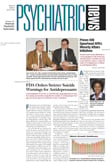Members of the Congressional Black Caucus last month heard from psychiatrists about racial disparities in diagnosis and treatment of ADHD.
An estimated 3 percent to 5 percent of African-American children have attention deficit/hyperactivity disorder (ADHD)—the same rate as Caucasian children.
However, the similarities end there. ADHD in African-American youth has been studied far less than ADHD in Caucasian children, and African-American youth have less access to comprehensive mental health assessments leading to fewer diagnoses and less treatment. Even when ADHD is detected, African-American youth are less likely to be treated with appropriate medications, said child psychiatrist M. Christopher Griffith, M.D., in an interview with Psychiatric News.
Griffith, an assistant professor of psychiatry at Morehouse School of Medicine in Atlanta, participated in a panel presentation on ADHD in African-American youth last month on Capitol Hill. Two other psychiatrists participated—Marilyn Benoit, M.D., immediate past president of the American Academy of Child and Adolescent Psychiatry, and Rahn Bailey, M.D., chair of the National Medical Association Section on Psychiatry.
Two patient advocates with children diagnosed with ADHD rounded out the panel. Former U.S. Surgeon General David Satcher, M.D., spoke via video satellite.
The panel briefing was co-sponsored by Reps. Sheila Jackson Lee (D-Tex.) and Donna Christian-Christensen (D-V.I.) in partnership with the organization Children and Adults With Attention Deficit/Hyperactivity Disorder (CHADD). About 30 professional health care and patient advocacy groups including APA joined CHADD in co-sponsoring the briefing.
“This is one of several CHADD initiatives to increase cultural competency among mental health professionals and eliminate disparities in care for minority populations,” CHADD Chief Executive Officer E. Clarke Ross said in a press release.
Griffith said that psychiatrists and mental health professionals have historically overdiagnosed African-American men as having severe mental disorders such as schizophrenia. A more recent trend is overdiagnosing African-American males with conduct disorder or oppositional defiant disorder and underdiagnosing ADHD in this population, said Griffith.
“The consequences for undiagnosed ADHD among African-American youth are significant including substance abuse, teen pregnancies, and occupational failures,” said Griffith.
African-American children face significant barriers in obtaining a comprehensive mental health assessment, including stigma about mental disorders in their communities, lack of mental health coverage, and poorer quality of health care and mental health treatment in general, Griffith said.
“Misinformation about the causes of ADHD or claims that it doesn’t exist don’t help parents seeking answers to their children’s problems,” said Benoit at the briefing.
Griffith said eliminating mental health care disparities among minorities will require a greater emphasis on the role of culture and race in medical school and residency training.
“In addition, we need to do a better job of attracting minorities into medicine, psychiatry, and research,” Griffith said.
The press release “Experts Assail Undertreatment of ADHD in African-American Youth” is posted at www.chadd.org. ▪
